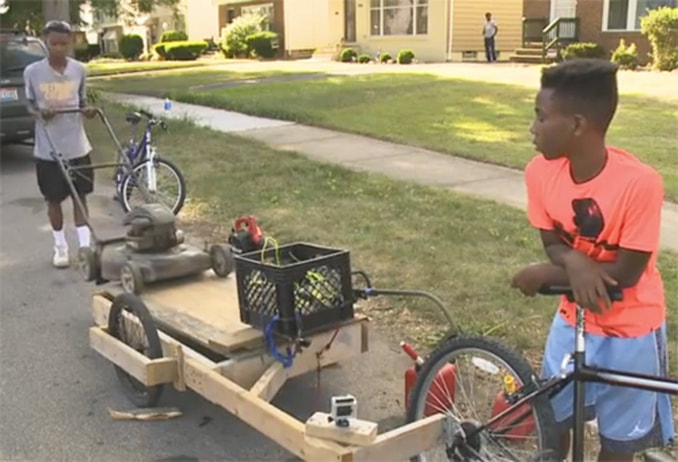To answer to that question, I should first describe some of my own summer work. Around age ten, what I did to earn money was something I suspect few others have tried: I sold radishes door-to door. Our family had a large garden, and I was allowed to pick some of the produce (red and white radishes), pack them in plastic bags, and peddle them around our neighborhood. Surprisingly many people bought the vegetables, probably less out love for radishes and more out of pity for the pathetic little kid with the big brown eyes.
The job that really proved profitable for me, however, was lawn mowing. For most of my teen years I regularly cut several neighbors’ lawns, plus a few others when they were away. This work taught me diligence, time management, and attention to detail. I also learned a few things about finances as I opened my own checking/savings account.
I was reminded of this work by a great news story I saw recently about a Cleveland teenager who started his own lawn care business. Cutting grass is a pretty common job for kids, but what distinguishes Daron Taylor’s work is that he made his business mobile by building a custom bike trailer, which enables him to tow his mowing equipment and cut lawns that are much farther from his home than he could otherwise reach.
As a former “lawntrepreneur” and avid bike rider, I really admire his innovation and initiative. As a marketer, I also appreciate his ability to leverage logistics and the “place” P of the marketing mix to expand his target market. However, with a broader target market also comes more and different competition, which is something another young lawntrepreneur learned in an unfortunate way.
As a KETV-7 News report described, fifteen-year old Jacob McDowall of Bellevue, NE thought he could build his lawn-mowing business through another of marketing's Four Ps--promotion. So, he bought some poster board, and his sister Bailei handwrote a sign that they placed in their front yard. Soon after, though, the sign surprisingly vanished. They made a second sign, and the same thing happened. This time, however, a video camera mounted on the family’s home caught the culprit—a professional landscaping company stole the sign.
Why would adults steal a kid’s lawn service sign? Most likely they were concerned about the competition. Over the last few decades, it seems there’s been a tremendous increase in lawn care companies. Landscaping is now a $77 billion industry in the U.S., comprised of over 472,000 companies. That makes about one landscaping firm for every 183 home owners. These statistics probably do not include small kid-run businesses like those of Daron and Jacob.
Given the stiff competition and the fact that nearly a million adults rely on landscaping services for their livelihood, maybe it is best to bar kids from being lawn service suppliers. However, you probably can anticipate my opinion on the issue, based on my own admittedly biased experience. My belief is kids should be allowed to market lawn mowing for money. Here are three reasons why:
1. Teens need to learn about working and managing money. Lawn mowing offers a great opportunity to do both, close to home, without requiring specialized training. Plus it’s physical work that benefits the body by keeping kids active.
2. There should be enough lawn care business for both adults and children. Yes, the two supplier segments will sometimes compete for the same customers, but there also should be significant differences in the target markets. Adult-run landscaping companies should have better equipment and the capacity to complete higher quality work, which may appeal to more affluent homeowners and to managers of business properties.
3. Adults tend to have opportunities to do thousands of different jobs that kids can’t do because of their age and lack of skills and training. There are exceptions, but in general, if adults find themselves competing head-to-head with kids for work, they probably have not done enough to develop their personal skillsets or to create competitive advantages for their companies.
Hardworking and innovative individuals have often played key roles in America’s success. As a nation, we can continue that tradition by encouraging young entrepreneurs, which both creates stakeholder value and upholds societal values. Not every business a child might start is necessarily good, but Lawntrepreneurship by kids tends to be “Mindful Marketing.”
Learn more about the Mindful Matrix and Mindful Meter.
Check out Mindful Marketing Ads and Vote your Mind!




 RSS Feed
RSS Feed